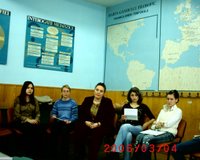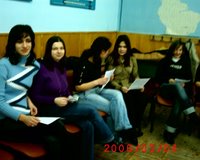The country’s name was adopted in 1862, after the foundation of the national state through the union of 2 Romanian Principalities - Moldova and Tara Romaneasca - in 1859.
Romania, like all other countries has, besides the geographic border, other borders, as well, like cultural, social, political or religious ones.
The idea is that this state, although it’s a medium sized one, holds within a great culture, a great past and, possibly a bright future.
It is one of the most important states in the Balkan region due to its surface and population. Its geographical position eases the access through Europe. On the north and east side, it has Ukraine and Moldova as neighbours, on the west, Hungary, on the southwest, Serbia, on the south, Bulgaria and on the southeast, The Black Sea. Two thirds of the frontier is run by rivers - (The Danube, Prut, Tisa)- and seacoast (The Black Sea). Within these boundaries, people we now call Romanians, have evolved through time. They have, in some cases, outdone themselves, and in others they have disappointed the whole nation.
Romania’s evolution was rather slow, slower than the other Latin countries. The development of written culture, for instance, began in the 16th – 18th century. Even so, the first documents that only have an aesthetic value, can’t be considered literature. The true Romanian literature began at the end of the 18th century and the beginning of the 19th. In the year 1848, every writer agreed on the fact that the language needed to be altered. New phrases had to be found. Writers turned to folklore, which they considered a source of aesthetic regeneration. Among the people that believed this were 2 of the greatest pioneers in literature: Vasile Alecsandri (1821 – 1890) a great poet and prose writer and Costache Negruzzi (1808 – 1868) who was not only the founder of the Romanian short-stories, but a model like no other in the writing of historical short stories. Besides these 2 there are lots of other well known writers like Mihai Eminescu, Ion Luca Caragiale, Ion Creanga, Tudor Arghezi, Ion Slavici, Lucian Blaga, Liviu Rebreanu, Mihail Sadoveanu, Camil Petrescu, Eugen Ionescu and many others. From a certain year, there seemed to have been an explosion of talents among the Romanian writers. Many made it to the universal literature, like Eugen Ionescu, but in spite the fact that they were born in Romania, many of them were not acknowledged as Romanians but as French. After this explosion everything came to a stop when Ceausescu and communism appeared.
Luckily communism was defeated and democracy came instead. This happened in 1989 when Ceausescu was murdered and a rebellion, which couldn’t be stopped, took place. Although the system changed and everybody had a right to their opinion, the politicians became worse than 2 decades ago. It seems that all they care for is themselves and money. Of course, this isn’t true for all of them, there are exceptions, too .
Education in Romania has a huge role. Everything that is taught in school till high-school seems to be a lot harder than in other countries. This may be because the Romanians are, truly smart people. Just look at how many representatives in science and technology there are. For example there is Henri Coanda which was recognized until a few years ago as a French flight pioneer. He is in fact a Romanian, the one that discovered the Coanda effect after inventing the first jet engine. Like him, Aurel Vlaicu and Traian Vuia are also great pioneers. Many young, brilliant people leave the country after they finish school. This is a huge loss in one way and a reason to be proud in another.
The Romanians have made mistakes along time but it’s only human. They are too naive; they don’t seem to be fighting for much. They have a long road to walk on but even so they have many things to be proud of. There are more smart people in this country than in many others. The problem is that only a few know it and only a few apply it. The ones that have made commendable things starting with architecture, art or music and ending with math, science or medicine got to be known, if not by the entire world, at least by Europe. Now, modern art seems to be very important. Many Romanian songs, for example, got to be known past the borders as well as Romanian movies like “Moartea domnului Lazarescu” that got a place in the top 10 movies made lately, competing with Hollywood’s best.
The people of this country lack something very important to make progress possible: maturity and will power. For example, everybody has a mind of their own, a personality and a psychic. Yet, when a person is asked if he has a psychologist he answers that he is not crazy. In all the other civilized countries, almost everybody goes to a psychologist once in a while. This proves the lack of maturity, knowledge and experience of the Romanians. Also, people don’t seem to be fighting for anything, not even for their lives, if not for others or for the whole country. This fact is proven, for example, by the folk ballad “Miorita” in which a man could easily escape death. Yet he refuses to do so, thus ending murdered.
Luckily there is something that keeps the citizens united and full of hope. That is God and the church.
Although Christianity is divided in 2 important parts, every Christian believes in God, even if the ways to prove it are different. In Romania 86,8 % of the people are Othodox, 4,7 % are Catholics and 8,5 % are other, rather newly formed cults.
As a conclusion Romania has its good sides and its bad sides like almost everything in this world.
All that it has to respect is its geographical border. As well as the other boundaries are concerned, the sky is the limit.
Student:Radulescu Radu
Form: 11th G
Teacher: Daniela Sitar ( teacher of Romanian)
Colegiul National “Mihai Eminescu” Baia Mare






